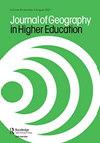The 1964 freedom schools as neglected chapter in Geography education
IF 1
4区 教育学
Q2 EDUCATION & EDUCATIONAL RESEARCH
引用次数: 1
Abstract
ABSTRACT Our paper revisits a neglected chapter in the history of geographic education–the civil rights organization SNCC and the Freedom Schools it helped establish in 1964. An alternative to Mississippi’s racially segregated public schools, Freedom Schools addressed basic educational needs of Black children while also creating a curriculum to empower them to become active citizens against White supremacy. Emerging out of a history of Black fugitive learning, Freedom Schools produced a critical regional pedagogy to help students identify the geographic conditions and power structures behind their oppression in the South and use regional comparisons to raise their political consciousness and expand their relational sense of place. Freedom Schools have important implications for higher educators, especially as contemporary conservative leaders seek to rid critical discussions of race from classrooms. They offer an evocative case study of the spatial imagination of the Black Freedom Struggle while pushing us to interrogate the inherent contradictions, if not antagonisms, between public higher education and emancipatory teaching and learning. Freedom Schools prompt a rethinking and expansion of what counts as geographic learning, whose lives matter in our curriculum, where and for whom we teach, and what social work should pedagogy accomplish.1964年的自由学校是地理教育中被忽视的一章
我们的论文回顾了地理教育史上一个被忽视的篇章——民权组织SNCC和它在1964年帮助建立的自由学校。自由学校是密西西比州实行种族隔离的公立学校的另一个选择,它满足了黑人儿童的基本教育需求,同时也制定了一套课程,使他们能够成为反对白人至上主义的积极公民。自由学校源于黑人逃亡学习的历史,它提出了一种批判性的地区教学法,帮助学生识别他们在南方受到压迫背后的地理条件和权力结构,并利用地区比较来提高他们的政治意识,扩大他们的地方关系感。自由学校对高等教育工作者有着重要的意义,尤其是在当代保守派领导人试图从课堂上消除对种族的批判性讨论的情况下。他们为黑人自由斗争的空间想象提供了一个令人回味的案例研究,同时推动我们质疑公立高等教育与解放式教学之间的内在矛盾,如果不是对立的话。自由学校促使人们重新思考和扩展什么是地理学习,谁的生活在我们的课程中很重要,我们在哪里和为谁教书,以及教育学应该完成什么社会工作。
本文章由计算机程序翻译,如有差异,请以英文原文为准。
求助全文
约1分钟内获得全文
求助全文
来源期刊

Journal of Geography in Higher Education
Multiple-
CiteScore
5.80
自引率
9.50%
发文量
29
期刊介绍:
The Journal of Geography in Higher Education ( JGHE) was founded upon the conviction that the development of learning and teaching was vitally important to higher education. It is committed to promote, enhance and share geography learning and teaching in all institutions of higher education throughout the world, and provides a forum for geographers and others, regardless of their specialisms, to discuss common educational interests, to present the results of educational research, and to advocate new ideas.
 求助内容:
求助内容: 应助结果提醒方式:
应助结果提醒方式:


